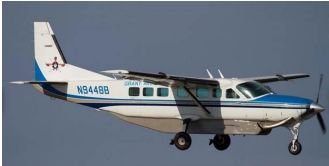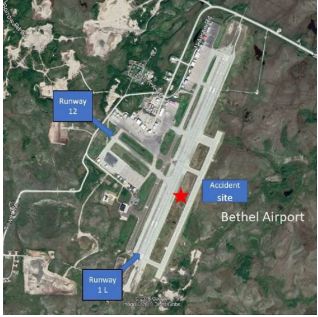Grant Aviation, Inc. v. Serco Inc., No. 3:20-CV-00043- JWS (D. Alaska Sep. 11, 2020), arose out of a non-fatal stall accident of a Cessna Caravan during a go-around at Bethel, Alaska. The Caravan was approaching for landing on Runway 12 while other aircraft were using Runways 1L and 1R. The pilot of the Caravan responded to an ATC instruction to "turn left immediately," upon which the airplane began a left turn, stalled, and impacted terrain. All six occupants escaped before the airplane was destroyed in a postcrash fire. Bethel was a contract tower with service provided by Serco under contract with the Federal Aviation Administration.

Figure 1. The accident aircraft during better times.
Grant Aviation, which owned and operated the passenger-carrying flight, alleged negligence by Serco's air traffic controller. Grant claimed that the controller failed to maintain separation between the Caravan and another aircraft simultaneously landing on another runway, which necessitated an urgent instruction to turn left because of the proximity of the other aircraft when the Caravan initiated a go around.
Serco moved to dismiss the Complaint for failure to state a claim on which relief can be granted. Serco argued the pilot had ultimate responsibility for operating the airplane. Grant Aviation responded that its pilot also had a duty to comply with ATC instructions. Applying the Twombly/Iqbal plausibility standard for evaluating the Complaint, the Court found Serco's position to lack adequate support.

Figure 2. The Caravan was attempting landing on Runway 12 while other aircraft were using Runways 1L and 1R.
The Court read the law to create concurrent standards of care for pilots and air traffic controllers: "While a pilot may be directly responsible for the aircraft's operation, a pilot's negligent performance of that duty does not necessarily relieve air traffic control of its own responsibilities." The Court decided that the liability questions in the case could not be resolved at the pleading stage because the finder of fact would have to "consider what the pilot should have known and done in light of all the circumstances ...." The case continues, and the NTSB has not yet closed its investigation. Grant Aviation, Inc. v. Serco Inc., No. 3:20-CV00043-JWS, 2020 U.S. Dist. LEXIS 166382 (D. Alaska Sep. 11, 2020).
The content of this article is intended to provide a general guide to the subject matter. Specialist advice should be sought about your specific circumstances.
